As one of the largest independent waste hauling companies in the state of Minnesota, Walters Recycling and Refuse, the company is focused on continued growth, expanding to new adjacent markets and priding themselves on having a great reputation in the marketplace.
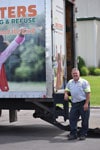
Walters Recycling and Refuse, Inc. (Walters) (Blaine, MN) was started in March 1988 by brothers Greg and George Walter. Their parents, Jack and Shirley, owned a waste hauling business, Walters Disposal Service, from 1956 until they sold it to Waste Management in 1982. The boys grew up working for their parents and when the business was sold, took positions at Waste Management in the Twin Cities area. After a few years, they decided that they would rather work for themselves, so in March 1988 they started Walters Recycling and Refuse. Using their own savings and credit cards, Greg and George bought two used rear-load trucks and a small route in St. Paul, MN and they were off. Times were lean initially with both driving routes during the day and Greg spending evenings maintaining the equipment while George managed the billing and administrative functions. They bet each other who could go the longest without a paycheck (Greg won after several months).
Since that start in 1988, Walters has grown to become one of the largest independent waste hauling companies in the State of Minnesota, doubling the business in the last five years. With a fleet of more than 70 vehicles, 120 team members and over 100,000 stops per week, they focus today on serving the greater Twin Cities metropolitan area. The company provides residential trash and single-stream recycling pickup, commercial trash and recycling, roll-off service and operates one of the busiest transfer stations in the state with a robust public drop-off service for virtually every material except for hazardous waste. They also have a growing service for both residential and commercial organics pickup. While the Twin Cities area does not yet have a robust organics transfer and processing infrastructure, demand for service is growing and Walters is driving business while the larger infrastructure is being planned and built. For example, starting in January 2020, the largest county in the metro area, Hennepin County, will be mandating that many types of commercial businesses participate in organics recycling and Walters is prepared to service this growth.
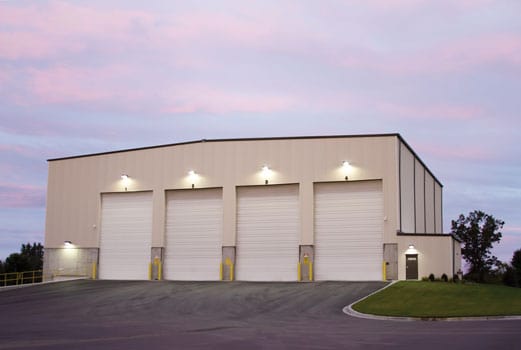
Organics started in the Twin Cities area a handful of years ago in a small way—a number of municipalities were pushing the hauling community to find ways to pick up organics; however, it has really started growing in the last 12 months and a lot of that has been driven by municipal mandate, requiring haulers to offer organics pickup as a part of their overall service. “The challenge that we are having here in the Twin Cities area is that there is very little capacity to process organics because there is not a lot of available land in the core metropolitan area, but there are a couple of facilities that are available outside of the major metro area,” says Mike Moroz, President and CEO of Walters. “Walters collects the material and transfers it to one of the facilities that is available, but they are reaching capacity. Demand is starting to catch up to the supply as it relates to processing. We are going to reach a point in the next 24 months where, unless the capacity increases, it will be a major challenge.” The organics that is collected is processed into really good compost. Some is bagged and sold to garden stores, while some is bought by the Minnesota Department of Transportation for use in their road construction (it acts as a great filter for road water runoff). Moroz also points out that many communities have incentives where if you participate in the organics program, you get free coupons for bags of compost, which helps drive participation.
Key Focuses Driving Growth
As the economy has been strong the past few years, Walters has taken advantage of driving growth across all divisions through increased housing starts and commercial construction. “One of the advantages of our industry is that it is fairly resistant to downturns in the economy,” says Moroz. “While there may not be significant growth during a downturn, there also isn’t a lot of customer churn as both residents and businesses still need waste and recycling service.”
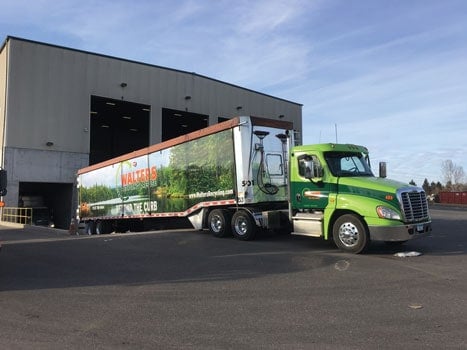
The impact of China Sword has left no one that works with recycling untouched. “The MRF processors in the Twin Cities area had been focused on developing local, or Midwest markets, for single-stream materials for years due to the cost of freight to the coasts and the environmental desire to minimize movement of the materials. This has allowed for some relief in comparison to many areas of the country, but commodity prices have still dropped dramatically, changing the system from a positive commodity value on average across all materials to a severely negative value. This has certainly forced those savvy enough to understand their P&Ls to increase prices through a combination of base rate increases and adding fees such as recycling commodity adjustments that can fluctuate with the markets,” explains Moroz. “In the local markets here they cratered initially but have been stable for the last few months so we can adjust to that and price accordingly.”
Walters has had to raise prices. However, Moroz says that the company has made sure to be proactive and communicate with their customers why there is an increase in service rates. “Unfortunately, people have been conditioned to believe that recycling should be free and that is not the case. When customers call in to voice their frustration with the price increase, I think we have done a good job explaining the situation and why it needs to be done. And we have had little customer churn as a result of this honest transparency.”
One of Walters’ key focuses in the area due to China’s National Sword has been on contamination. Many local haulers have begun to charge contamination fees to customers who are disposing of non-recyclable items in their single-stream cart/container. Walters is still evaluating this idea while spending extra efforts to educate customers. “The biggest culprit that we are seeing are plastic bags. Customers are continuing to put all of their single-stream recycling into plastic bags and into the recycling cart, which is a huge no-no. We have launched some initiatives to educate our customers on the fact that you cannot do that. We have done a lot of community events, partnering with the businesses that we service, getting with their team and educating them on recycling dos and don’ts. We are also retrofitting our existing commercial containers and new ones deployed into service with ‘no plastic bags stickers’. We are also sending out letters to our existing customers, so that has been helpful from a commercial standpoint. For the residential side, if a driver sees plastic bags or other items that are not recyclable, we put an ‘oops!’ tag on the carts. Since the program started (in fall 2018), our driver feedback has been positive—the tags have helped particularly since they know their stops and what goes in the bin, they can see the improvement. We tested it in just a few of the communities we serve to see if it would have a negative impact on driver productivity and it has not,” says Moroz.
Development and Training
Walters has implemented robust training programs for both onboarding new team members as well as ongoing development programs. The two most robust training programs the company has are for new drivers and customer service reps. For customer service reps, they have leveraged an online training tool comprised of a series of tests covering the company history, values, culture, as well as detailed specifics on the company policies and how to use their systems. These tests are taken over a two-week period and supervisors can see when the employee is issued the test online and when they have taken it. If they have not taken it, the supervisor can follow up with them. A new customer service rep learns not only about how systems and policies work, but time is also taken to learn about the industry and how materials flow throughout the supply chain.
New driver training is robust but a continued work in process. New hires, regardless of experience, go through detailed safety training as a key first step in their journey before getting into a truck. Three years ago, Walters implemented Smith System training for all drivers, new and old. A testament to its success is a team parking lot full of cars backed into their stalls, which elicits comments and questions from customers or vendors who ask why this is happening. After safety and company onboarding, drivers get in a truck but do not drive yet. Instead, they learn the route and Routeware system without having the added distraction of driving. During this time they also learn the details and operation of the truck itself, including transfer station or MRF rules and procedures, fueling, dispatch and communication protocols, etc. Once their trainer certifies they are comfortable with these items, they begin driving with a trainer. Depending on ability to catch on this entire process could take two to three weeks. Once the trainer certifies they are safely operating the vehicle and route, they are released to drive on their own, with daily feedback on their progress. “We have also completed a SWOT analysis on each of our mechanics and are developing tailored development and training programs for each. If a mechanic shows an aptitude for brakes, for example, we send them to training to enhance those skills and turn them into our subject matter experts,” says Moroz.
He continues, “We just completely restructured our onboarding program in the last 12 months. It has become much more thorough around the specifics of the job as well as our company culture and how we do things. As everyone in the industry has seen, it has become more difficult to hire new drivers and employees. We are fortunate right now to be fully staffed going into the busy final push of yard waste season and we think this is the case because we have focused relentlessly on both recruiting and retention. We are spending more time making our new team members feel welcome, following up with them after certain intervals of time after starting, checking in to see how they are doing and making them feel more part of the team, knowing they can voice concerns and challenges when needed. By doing this, we have found that our retention rate has improved dramatically, helping keep us fully staffed.”
In 2018, Walters embarked on a major initiative called Total Process Reliability (TPR). Explains Moroz, “In 2017 we started keeping track of breakdowns with reason codes daily while trying to figure out how to reduce them. We had a few nice wins but couldn’t find the Holy Grail. We’d read about Waste Management’s Maintenance Service Delivery Optimization efforts and Republic Service’s OneFleet program and came to the conclusion that we had a big opportunity in front of us if we approached this with a longer-term vision and managed this well.”
The program is broken down into seven categories, each comprised of a dedicated team focused on that effort (Preventative Maintenance, Planning and Scheduling, Operator Care, 5S Process, Root Cause Analysis, Inventory Control, and Promote and Publicize). It is a multi-year process. October 1 was the end of Walters’ first year and they are now into year two. “There is definitely a culture change. The early months were spent learning and getting immersed in the processes and language of continuous improvement, and now the teams are working on some very powerful projects that we can already see are starting to have an impact. Even the team has responded well. We have included everyone in the process—from customer service to marketing to office staff, etc.—on what TPR is, what we are doing and why it is important. For the seven different initiatives, we have broken each one into a different team and have representation from throughout the organization on each—two-thirds of the organization are on a team. And those that aren’t on a team right now are helping support those who are, for example, by a driver helping on a route for a teammate who is at an implementation meeting. Once we are done in the shop and the fleet, those sets of disciplines learned will be brought to bear throughout every aspect of the organization. So those will be our next steps. One of our core values is teamwork; it is important that we drive results as a team,” Moroz says.
As far as safety is concerned, Walters has two tag lines that encompass their brand and what the company is trying to accomplish. One is “Beyond the Curb”, which means Walters strives to do more than just pick up the trash and recycling. It means going above and beyond and taking pride in the fact that they are a leader in keeping communities clean. The other tag line is “Safe, Simple, Service”, which is how Walters wants to operate every day. “Safety is at the front of this effort,” says Moroz. “We have numerous resources dedicated to safety, including a safety manager and a safety committee comprised of team members throughout the company who work on policy, root cause analysis, training and communication. We have monthly safety meetings with the drivers and mechanics to review best practices and discuss issues that may have arisen. And we have rigorous metrics that are tracked so safety is always at the forefront of everything we do.”
Facing Challenges
Over the past few years, Walters’ biggest challenge has been finding good drivers and mechanics. Through much effort, including an initiative called “Beyond the Paycheck”, the company has focused on both recruiting and retention efforts. Results have been impressive, with Walters being fully staffed in both their driver and mechanic teams, a reduction in turnover and improved engagement scores (using the Gallop Q12 system to measure engagement annually).
Says Moroz, “The number one challenge facing the industry today is finding good drivers and mechanics, especially for those businesses that are growing and adding incrementally to the team. Minnesota has a 3.3 percent unemployment rate, better than the 3.7 percent national rate, and finding skilled workers is a major challenge. We have an outstanding HR team and through their hard work and focus collaborating with our operations leaders, we are blessed to have been fully staffed for most of this year, but things can always change quickly so we stay vigilant.”
Driving Planning and Focus
Moroz believes that a key driver of Walters’ performance has been implementing the Traction/Entrepreneurial Operating System (EOS). Prior to this, simple things like having a weekly staff meeting and reviewing a to-do list would inevitably result in going through the same list again, still working on the same things and having the same conversations. After reading the book, Traction, and thinking about the principles primarily around accountability, Walters thought they could implement the program and it has been a game changer for the business. “We started this journey in 2015. For the first year, we self-implemented, following the book’s steps and focusing only on our senior management team and owners. We all agreed to move forward with the ideas presented, commit to it and start the process, essentially managing it on our own. We did find we were having some success immediately, but at the same time we felt frustrated with some things that we believed were missing, such as are we tracking the right KPIs? Or are we measuring them on the right frequency? Are we pushing ourselves hard enough in terms of quarterly “rocks”? After the first year, we did some extensive research and decided to hire The Resultants, a company that specializes in coaching companies on this EOS journey. They have been instrumental in helping us since then on a quarterly basis—determining the priorities for the next quarter, having discussions in between to keep us on track, sharing best practices from other businesses who are also EOS companies, etc.,” says Moroz. “Now, we are coming up on our 5th year of this journey and it has been remarkable how it has driven planning, focus and accountability throughout the organization. In simple terms, we detail a three-year rolling plan, a one-year plan including quarterly “rocks” that are key areas of focus that lead to hitting the one-year plan, as well as weekly “L10” meetings that drive accountability around hitting those rocks and solving issues that arise.”
The system has also been cascaded throughout the organization. For example, Customer Service and Operations teams have their own separate set of rocks and meetings that are in alignment with the corporate rocks, so everyone is rowing in the same direction and towards the same goals. It has been a key driver in enabling Walters to double the size of the business in the last five years. As part of the EOS process, the company has focused on “right people, right seat” and built an outstanding team throughout the entire organization that can take them to the next level of growth and performance.
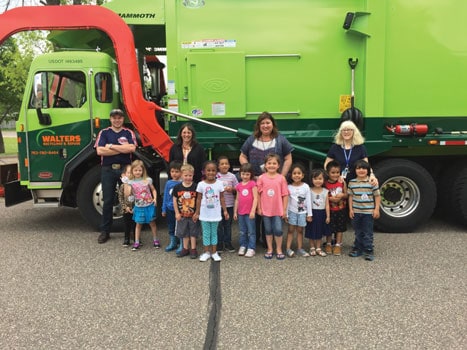
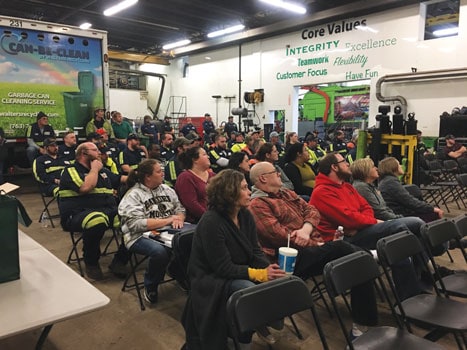
Reaching Out to the Community
Walters is a strong supporter of many local non-profits, focused on helping those in need throughout the communities served. Two key areas of focus include youth sporting organizations and school district foundations that focus on youth athletic programs. And the other is assisting organizations that help the homeless or vulnerable. One of the programs in particular, Stepping Stone, helps those who are in need of emergency housing, providing shelter and programs to adults experiencing homelessness. The company also helps support programs for women who have been emotionally and/or physically abused who need help and shelter.
In addition, Walters has fun participating in numerous parades and touch-a-truck events throughout the Twin Cities metro area. “Greg Walter and our mechanic crew recently finished building a parade truck specifically for use in these types of events. It’s a 1948 2.5 ton Chevrolet cab with a small 6-yard rear-load packer that doesn’t require a CDL to drive, giving us the fun option to extend our reach and participate in more community events.”
New Markets
Celebrating their 31st anniversary this past March, Walters is actively looking for available facilities or land to build on within the next 18 to 24 months since they are rapidly running out of parking space for the growing fleet and team. The current facility is surrounded on three sides by wetlands that cannot be mitigated. “We’re landlocked and running out of space due to our growth—a nice problem to have,” says Moroz.
The company is focused on continued growth through building density within current markets as well as expanding to new adjacent markets. Says Moroz, “We have focused for the last five years primarily on increasing route density and driving corresponding margins, and while there is more great opportunity here our next major step in growth is to expand outward. There are some adjacent areas that we are not heavily in for either commercial or residential work. About 30 percent of the cities in Minnesota have organized garbage collection through municipal contracts, while the rest of the market allows customers to pick their own hauler. This open subscription market is very attractive to us. We pride ourselves on having a great reputation in the marketplace, built on the Walter family’s foundation of doing the right thing always. This combined with a great team gives us the formula for continued growth and success.” | WA
For more information or to contact Walters Recycling and Refuse, Inc., Mike Moroz can be reached at 763-210-5030 or [email protected].
